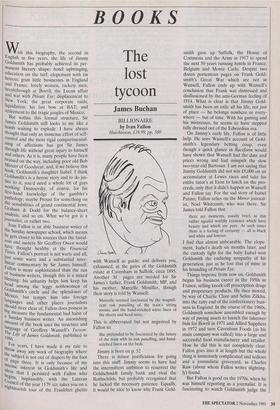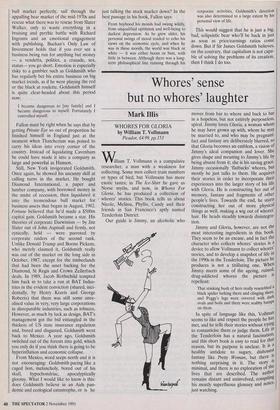BOOKS
The lost tycoon
James Buchan
BILLIONAIRE by Ivan Fallon Hutchinson, .f18.99, pp. 500 With this biography, the second in English in five years, the life of Jimmy Goldsmith has probably achieved its per- manent literary shape: hotel upbringing, education on the turf, elopement with tin heiress; grim little businesses in England and France, lovely women, rackety men; breakthrough at Bovril; the Lucan affair and war with Private Eye; displacement to New York; the great corporate raids; liquidation; his last bow at BAT; and retirement to the tragic jungles of Mexico. But within this formal structure, Sir James Goldsmith still looks to me like a bomb waiting to explode. I have always thought that only an immense effort of self- control and the most rigid compartmental- ising of affections has got Sir James through life without great injury to himself and others. As it is, many people have been bruised on the way, including poor old Bob Mercer of Goodyear, and, if we believe this book, Goldsmith's daughter Isabel. I think Goldsmith's is a heroic story and to do jus- tice to it, you'd need a whole lot of guys Working: Dostoevsky, of course, for his first-hand knowledge of the gambler's Pathology; maybe Proust for something on the sensibilities of grand continental Jews; Graham & Dodd for the balance-sheet analysis; and so on. What we've got is a Journalist, or rather two. Ivan Fallon is an able business writer of the Sunday newspaper school, which means he gets closer to his sources than the fastid- ious and austere Sir Geoffrey Owen would lLave thought healthy at the Financial limes. Fallon's portrait is not warts and all, Just some warts and a substantial inter- linear commentary by Sir James himself. Fallon is more sophisticated than the run of business writers, though this is a mixed blessing: his urbanity helps him keep his head among the leggy noblewomen of Goldsmith's circle and the splendours of Mexico, but tempts him into foreign
I anguages and other places journalists
iahould steer clear of. Fallon does possess in 918 Measure the fundamental bad habit of a Sunday business writer. An astonishing ,amount of the book uses the structure and anguage of Geoffrey Wansell's Tycoon: I tie 1986.Life of James Goldsmith, published in t, For years, I have made it my rule to ,n, row away any work of biography where , ,..7 subject is not out of diapers by the foot Page three. It is only because of my !Tense interest in Goldsmith's life and Llueas that I persisted with Fallon who egins, implausibly, with the Lateran vOuncil of the year 1179 AD; takes you on a nightmarish tour of the Frankfurt ghetto with Wansell as guide; and delivers you, exhausted, at the gates of the Goldsmith estate at Cavenham in Suffolk, circa 1895. Another 30 pages are needed for Sir James's father, Frank Goldsmith, MP, and his mother, Marcelle Mouiller, though their story is told by Wansell:
Marcelle seemed fascinated by the magnifi- ccnt oak panelling of the train's sitting rooms, and the hand-stitched white linen of the sheets and head rests.
This is abbreviated but not improved by Fallon to:
She pretended to be fascinated by the luxury of the train with its oak panelling, and hand- stitched linen on the beds.
Jimmy is born on p. 52 There is minor justification for going into this stuff. Jimmy seems to have had the intermittent ambition to resurrect the Goldschmidt family bank and rival the Rothschilds, but probably recognised that he lacked the necessary patience. Equally, it would be nice to know why Frank Gold- smith gave up Suffolk, the House of Commons and the Army in 1917 to spend the next 50 years running hotels in France, Belgium and Monte Carlo. Despite two dozen portentous pages on Frank Gold- smith's Great War which are not in Wansell, Fallon ends up with Wansell's conclusion that Frank was distressed and disillusioned by the anti-German feeling of 1914. What is clear is that Jimmy Gold- smith has been an exile all his life, not just of place — he belongs nowhere or every- where — but of time. With his gaming and his mistresses, he seems to have stepped fully dressed out of the Edwardian era.
On Jimmy's early life, Fallon is of little help. He uses Wansell's account of Gold- smith's legendary betting coup, even though a quick glance in Raceform would have shown that Wansell had the date and prices wrong and had misspelt the slow two-year-old Bartosan. I am not saying that Jimmy Goldsmith did not win £8,000 on an accumulator at Lewes races and take his entire tutor's at Eton to lunch on the pro- ceeds, only that it didn't happen as Wansell and Fallon say. For the sad story of Isabel Patin°, Fallon relies on the Mirror journal- ist, Noel Whitcomb, who was there. Sir James told Fallon that
there are moments, usually brief, in this rather squalid worldly existence which have beauty and which are pure. At such times there is a feeling of certainty — all is black and white and forever.
I find that almost unbearable. The elope- ment, Isabel's death six months later, and the custody fight for the baby Isabel won Goldsmith the enduring sympathy of his generation, just as he lost that of mine in his hounding of Private Eye.
Things improve from now on. Goldsmith began his business career in the 1950s in France, selling knock-off prescription drugs and proprietary products. He then moved, by way of Charlie Clore and Selim Zilkha, into the ratty end of the confectionery busi- ness in England. In the course of the 1960s, Goldsmith somehow assembled enough by way of paying assets to launch the takeover bids for Bovril in 1971 and Allied Suppliers in 1972 and turn Cavenham Foods (as his main company was called) into a large and successful food manufacturer and retailer. How he did this is not completely clear. Fallon goes into it at length but the whole thing is immensely complicated and tedious and a journalistic graveyard, as Charles Raw (about whom Fallon writes slighting- ly) found.
But Fallon is good on the 1970s, when he was himself reporting as a journalist. It is fascinating to watch Goldsmith judge the bull market perfectly, sail through the appalling bear market of the mid-1970s and rescue what there was to rescue from Slater Walker, only to waste everything in a bruising and pyrrhic battle with Richard Ingrams and an emotional engagement with publishing. Buchan's Only Law of Investment holds that if you ever see a business being run for anything but money — a vendetta, politics, a crusade, sex, status— you go short. Emotion is especially risky to a gambler such as Goldsmith who has regularly bet his entire business on big market trends, as if he were playing the red or the black at roulette. Goldsmith himself is quite clear-headed about this period now:
I became dangerous to [my family] and I became dangerous to myself. Fortunately I controlled myself.
Fallon must be right when he says that by getting Private Eye so out of proportion he finished himself in England just at the moment when Thatcherism was poised to carry his ideas into every corner of the country. Instead of liquidating Cavenham he could have made it into a company as large and powerful as Hanson.
Still, New York invigorated Goldsmith. Once again, he showed his uncanny skill at calling turns in the market. He bought Diamond International, a paper and lumber company, with borrowed money in the midst of recession, then liquidated it into the tremendous bull market for business assets that began in August, 1982. Fortune believed that he'd made a $500m capital gain. Goldsmith became a star. His theories of corporate Darwinism — by Jim Slater out of John Aspinall and firmly, not cynically, held — were parroted by corporate raiders of the second rank. Unlike Donald Trump and Boone Pickens, who merely claimed it, Goldsmith really was out of the market on the long side in October, 1987, except for the timberlands that had been the asset backing for the Diamond, St Regis and Crown Zellerbach deals. In 1989, Jacob Rothschild tempted him back in to take a run at BAT Indus- tries in the evident conviction (shared, inci- dentally, by Henry Kravis and George Roberts) that there was still some unre- alised value in very, very large corporations in disreputable industries, such as tobacco. However, as much by luck as design, BAT's management got the bid entangled in the thickets of US state insurance regulation and, bored and disgusted, Goldsmith went back to Mexico. A year ago, Goldsmith switched out of the forests into gold, which you only do if you think there is going to be hyperinflation and economic collapse.
From Mexico, word seeps north and it is not encouraging: Goldsmith pacing like a caged lion, melancholy, bored out of his skull, hypochondriac, apocalyptically gloomy. What I would like to know is this: does Goldsmith believe in an Aids pan- demic and ecological catastrophe, or is he
just talking the stock market down? In the best passage in his book, Fallon says: From boyhood his moods had swung wildly, from unqualified optimism and well-being to darkest depression. As he grew older, his personal swings of mood tended to echo his views on the economic cycle, and when he was in these moods, the world was black or white — it was either boom or bust, with little in between. Although there was a long- term philosophical line running through his corporate activities, Goldsmith's direction was also determined to a large extent by his personal view of life.
This would suggest that he is just a big, bad, solipsistic bear who'll be back in just as soon as price/earnings ratios come down. But if Sir James Goldsmith believes, on the contrary, that capitalism is not capa- ble of solving the problems of its creation, then I think I do too.



































































 Previous page
Previous page